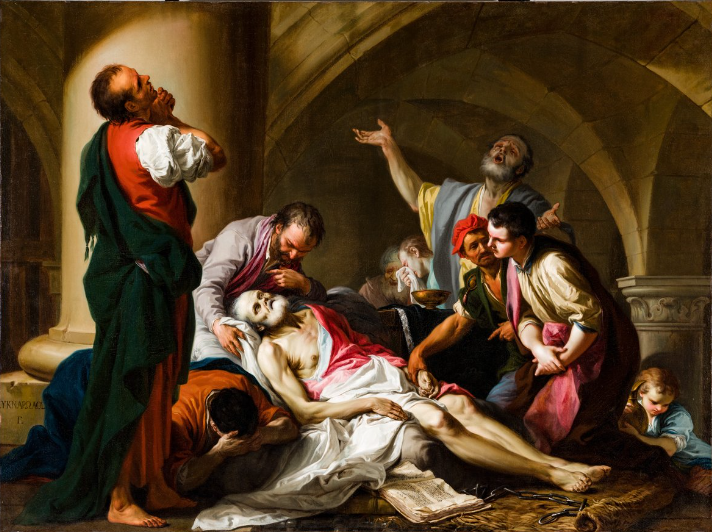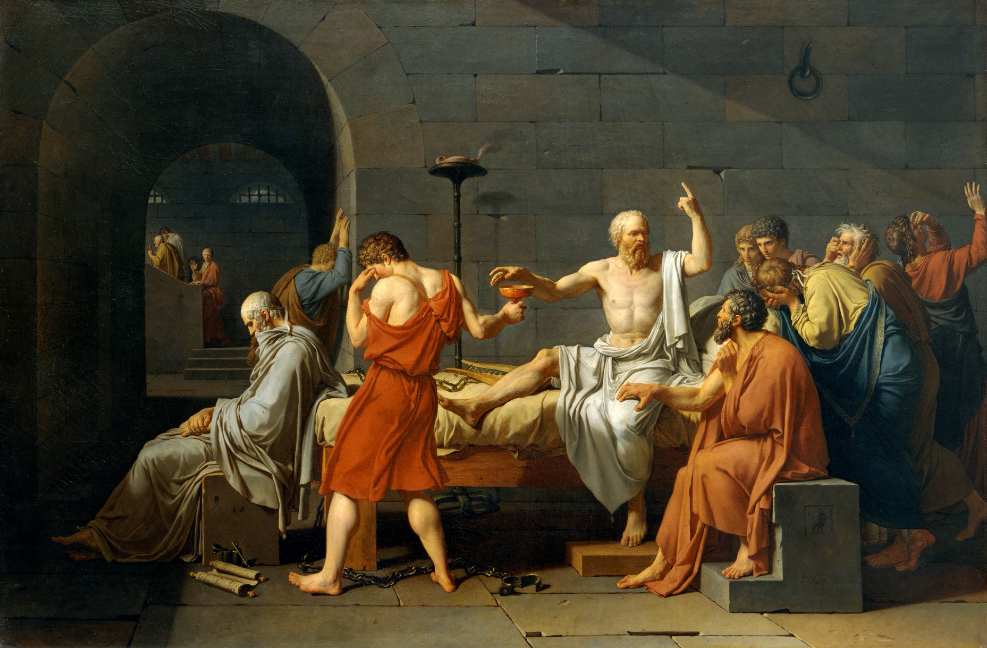In the bustling agora of ancient Athens, amidst the fervor of debates and the symphony of bustling sandals, one figure stood as a philosophical luminary: Socrates.
Picture this—a man of simple robes and an insatiable thirst for wisdom, weaving through the crowds with a twinkle in his eye and questions that carved through complacency like a sculptor’s chisel.
Now, fast forward to a poignant moment, the twilight of Socrates’ life, where the philosopher’s unyielding pursuit of truth and his unflinching commitment to his ideals would cast a dramatic light on his final hours.
The echoes of his resolute steps through the agora reverberate still, as we venture into the heart of Socrates’ ultimate journey—a journey that reveals not just his passing, but a legacy of courage, inquiry, and an unshakeable bond with mortality itself.
Also Read: Diogenes – Unveiling the Life, Philosophy, and Wit of the Iconic Cynic Philosopher
I. The Context of Socrates’ Death:
To truly understand the weight of Socrates’ last moments, we must first grasp the historical and political backdrop of Athens in the 5th century BCE. It was a time of great intellectual and political ferment.
Socrates’ unorthodox beliefs and his role as a mentor to impressionable minds made him a figure of both admiration and suspicion.
As Athens grappled with political turmoil, Socrates’ trial and subsequent charges of corrupting the youth and promoting impiety would mark the beginning of his final chapter.

Verona 1706 – 1770 Verona
II. The Farewell Dialogue:
As Socrates awaited his execution in prison, a procession of friends, students, and devoted followers came to bid their last farewells. Among them was his loyal companion, Plato, a young philosopher whose life would forever be intertwined with Socrates’ legacy.
As visitors gathered around him, Socrates engaged in discussions that were characteristic of his lifetime pursuit of knowledge and truth.
Xanthippe, his wife, and their children also graced him with their presence, revealing the human dimensions of a man revered for his intellectual prowess.
Must Read: 15 Friedrich Nietzsche Quotes for the Insane
III. Facing Mortality with Philosophical Courage:
The heart of Socrates’ philosophy lay in his unflinching pursuit of wisdom, even as death beckoned. His views on mortality were presented in dialogues recorded by his disciple Plato.
In these dialogues, Socrates’ calm acceptance of death emerges, grounded in the belief that the soul is immortal and death merely a transition.
His unwavering commitment to principles found its zenith in his final hours, as he embraced his fate with a sense of purpose that transcended the physical realm.
Also Read: Michel Foucault: The Philosopher and Historian
IV. The Hemlock Scene:
The day of reckoning arrived, and Socrates’ resolve remained unshaken. Surrounded by friends and onlookers, he calmly accepted the cup of hemlock—a bitter concoction that would usher him into the realm of the unknown.
His friends wept, his students trembled, yet Socrates stood resolute, embodying his teachings until the very end. As the poison took effect, he remained conversational, a testament to the strength of his convictions.

V. Legacy and Influence:
The news of Socrates’ death reverberated throughout Athens and beyond. His departure marked the end of a life lived in pursuit of truth and virtue. But rather than fading into obscurity, Socrates’ legacy endured.
His influence on Plato, who meticulously chronicled his mentor’s philosophy, ensured that Socrates’ teachings would find permanence in the annals of philosophy. The Socratic method, a cornerstone of critical thinking, continued to shape generations of thinkers who sought to emulate his intellectual rigor.
VI. Comparisons with Other Philosophical Deaths:
Socrates’ death stands as a unique episode in the history of philosophy, yet it invites comparison with other philosophical deaths that resonated with similar themes.
The martyrdom of Giordano Bruno and the defiance of Søren Kierkegaard offer parallels, highlighting the enduring human struggle to reconcile philosophical ideals with mortal limitations.
Also Read: How do I know I Exist?
VII. Socratic Irony and Legacy:
Socrates’ death was, in many ways, an embodiment of the Socratic irony he often employed in his dialogues. His unwavering commitment to truth led him to a death that underscored the incongruity of his conviction.
Yet, paradoxically, this very irony magnified his legacy. His willingness to die for his beliefs added a layer of authenticity to his teachings that has captivated minds for centuries.
Final Thoughts
In the final moments of his life, Socrates’ indomitable spirit shone brightly. He merged philosophy and mortality, leaving an indelible mark on humanity’s quest for understanding.
As we reflect on his journey, we find inspiration in his courage, comfort in his wisdom, and a reminder that the pursuit of truth is a timeless endeavor that even death cannot extinguish.
The cup of hemlock became his final dialogue, a testament to a life lived in relentless pursuit of knowledge and virtue, and a legacy that continues to enrich the tapestry of human thought.
References:
- Plato’s works, especially “Phaedo” and “Apology,” for insights into Socrates’ philosophy and his final moments.
- Xenophon’s “Memorabilia” for another perspective on Socrates’ life and teachings.
- “The Trial and Death of Socrates” by F. M. Cornford, a classic work analyzing Socratic philosophy and his trial.
- “Socrates: A Man for Our Times” by Paul Johnson, which explores Socrates’ life, thoughts, and impact.
- Academic journals and articles on philosophy, history, and ancient Greece, available through databases like JSTOR and Google Scholar.